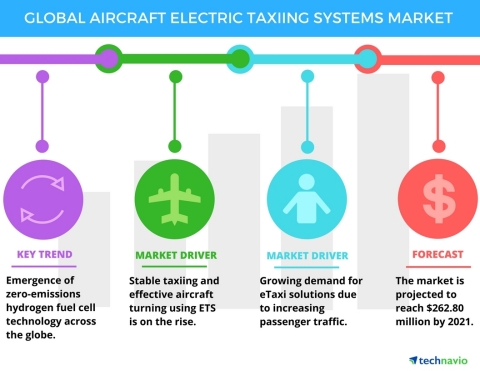LONDON--(BUSINESS WIRE)--Technavio analysts forecast the global aircraft electric taxiing systems market to reach USD 262.80 million by 2021, according to their latest report.
The research study covers the present scenario and growth prospects of the global aircraft electric taxiing systems market for 2017-2021. The report further segments the market based on the product (vehicular and non-vehicular) and geography (the Americas, APAC, and EMEA).
Every year, around 17 million tons of carbon dioxide are emitted during aircraft taxiing operations. It is expected that Integration of ETS will provide numerous benefits to airlines and airports. It not only reduces the effect of carbon emissions on the environment but also benefits airline operators with more efficient flight cycles. One of the primary reasons for the integration of ETS is to eliminate the use of tow trucks, which in turn, will avoid personnel and fuel costs and tow truck maintenance.
Looking for more information on this market? Request a free sample report
Technavio’s sample reports are free of charge and contain multiple sections of the report including the market size and forecast, drivers, challenges, trends, and more.
Technavio aerospace and defense analysts highlight the following three factors that are contributing to the growth of the global aircraft electric taxiing systems market:
- Growing demand for eTaxi solutions
- Stable taxiing and effective aircraft turning using ETS
- Rise in competition
Growing demand for eTaxi solutions
Because of increase in passenger traffic, airline operators have increased the frequency of flights and added new routes to their portfolio, resulting in an increase in fleet size. Therefore, airport operators are focusing on new opportunities to increase their profit margins while reducing operating costs. Conventionally, pilots use APUs along with a single engine during aircraft taxiing. This method is cost efficient to a certain extent but adoption of new developments, such as ETS, will allow zero fuel consumption in addition to cost efficiency.
Avimanyu Basu, a lead aerospace components research analyst at Technavio, says, “In the research and development domain, aviation stakeholders are looking for future technologies that will have a positive impact on the environment. Thus, aircraft manufacturers are supporting ETS, which can be implemented to support aircraft nosewheel or main landing gear of an aircraft.”
Stable taxiing and effective aircraft turning using ETS
According to the structure of an aircraft, the turning radius may have practical limits during nosewheel controlled taxi operations. Generally, centripetal forces and cross-wind forces are the two factors that affect aircraft taxiing stability. An aircraft could be exposed to the risk of overturning if a lateral component of such forces becomes excessive. Also, steering controllability will be further complicated in the case of nosewheel loading and during possible shifts in aircraft's center of gravity. To avoid overturning of aircraft, its taxiing speeds are maintained according to predetermined safety limits.
“The average taxiing duration of an aircraft is relatively lengthy, causing high fuel burns and resulting in an increase in operating costs. Thus, there is a need for an aircraft taxi system that will safely enable faster taxiing speeds and short-radius turning. This is one of the major driving factors propelling aircraft ETS as it allows safe aircraft taxiing at a higher speed,” adds Avimanyu.
Rise in competition
The growing demand for eTaxi solutions is driving aerospace prime defense contractors to focus on innovations that can deliver low operating costs for airlines and reduce fuel consumption and the time required to pushback aircraft from airport stands. The solutions should also be able to eliminate engine wear, which in turn, would reduce ground operations prone to FOD and engine blast threats.
Top vendors:
- Israel Aerospace Industries
- Technodinamika
- WheelTug
Browse Related Reports:
- Global Airport Walkway Market 2017-2021
- Global Unmanned Aerial Vehicle (UAV) Market 2017-2021
- Global Airport Digitization Market 2017-2021
Become a Technavio Insights member and access all three of these reports for a fraction of their original cost. As a Technavio Insights member, you will have immediate access to new reports as they’re published in addition to all 6,000+ existing reports covering segments like defense, aerospace, and defense technology. This subscription nets you thousands in savings, while staying connected to Technavio’s constant transforming research library, helping you make informed business decisions more efficiently.
About Technavio
Technavio is a leading global technology research and advisory company. The company develops over 2000 pieces of research every year, covering more than 500 technologies across 80 countries. Technavio has about 300 analysts globally who specialize in customized consulting and business research assignments across the latest leading edge technologies.
Technavio analysts employ primary as well as secondary research techniques to ascertain the size and vendor landscape in a range of markets. Analysts obtain information using a combination of bottom-up and top-down approaches, besides using in-house market modeling tools and proprietary databases. They corroborate this data with the data obtained from various market participants and stakeholders across the value chain, including vendors, service providers, distributors, re-sellers, and end-users.
If you are interested in more information, please contact our media team at media@technavio.com.




